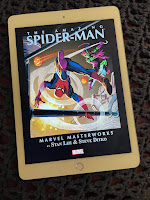
I continue to work my way through Isaac Asimov's classic Foundation novels, and recently finished book two in the series, Forward the Foundation. Like the entry before it, Prelude to Foundation, this second prequel to the core Foundation Trilogy does a nice job relating previously untold details and vignettes that lead up to the way things stand in the classic trilogy (Foundation, Foundation and Empire, and Second Foundation). Also like the other books in the series, Forward the Foundation is an engaging mix of lighthearted banter (usually involving human pettiness) and mind-blowing science-fiction concepts.
But as well as showing human flaws playing out against a cosmic backdrop, and advancing the Foundation storyline, Forward the Foundation also does another interesting thing: it tells a complete, well-developed story examining the theme of having to let go- to one's career, to one's friends, to one's sense of purpose- as age inevitably takes its toll. This book is really about genius psychohistorian Hari Seldon having to make peace with the fact that saving the galaxy is a young man's game, and that he should get off the stage in a dignified manner while he can still make that choice on his own. Anyone who has been at a job more than twenty years will feel a little of what Hari feels in this book, as he reluctantly sees that his colleagues are now the ones with the energy, drive, and focus to do what needs to be done.
Making things doubly difficult is the fact that Hari's mind is still sharp enough to see that he doesn't have the juice anymore to steer the ship, and to fully feel an encroaching depression caused by the many deaths (some natural but many otherwise) of his friends and colleagues, as he gets older and older. Some have said that Dr. Asimov, who died shortly after writing Forward the Foundation, was really writing about his own issues as he sensitively outlined Seldon's. There is probably some truth to that.
So, Forward the Foundation is ultimately both a decent novel in the Foundation series (it smoothly leads right into the next book, 1951's classic Foundation), but is also a sensitive treatise on mortality, every bit as moving and effective as any given film or literary novel on the subject. I expected the former, but was surprised to also get the latter.
"Forward the Foundation" is available in print, Kindle, and audio editions.



No comments:
Post a Comment